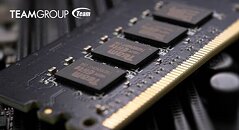Tuesday, December 15th 2020

Team Group Successfully Develops Consumer-Grade DDR5 Memory, Begins Validation
Team Group, a global leader in computer memory, has rapidly responded to market demand changes during the crucial transition period of next-generation DRAM technology. By integrating the newest technologies to promote its development of DDR5 memory, it has outpaced competitions and developed the first engineering sample of consumer-grade DDR5 memory. With this success, it will welcome the new DDR5 generation with consumers worldwide.
Presently, Team Group is working hard at producing its first batch of DDR5 memory with the tentative specifications of 16 GB, 4800 MHz, and 1.1 V for a single module. The company is cooperating with major motherboard manufacturers, such as ASUS, MSI, ASRock, and GIGABYTE, providing memory and working together with their R&D divisions to perform validation tests. Through the collaboration of R&D teams, Team Group was able to accelerate the development of its DDR5 memory by adjusting the initial parameters. The successful completion of the validation phase will confirm that the frequencies of standard DDR5 products surpass those of overclocked DDR4 products, and will represent another big step forward in the evolution of computer memory.It is expected that consumers will not need to enter BIOS to enable the overclocking function as the DDR5 generation begins. After installing DDR5 memory, consumers can directly boot up their computers and experience the high performance without the overclocking step of DDR4. The powerful advantages of faster DDR5 will be instantly demonstrated and consumers will be able to effortlessly enjoy the extreme speed brought by the new generation.
Presently, Team Group is working hard at producing its first batch of DDR5 memory with the tentative specifications of 16 GB, 4800 MHz, and 1.1 V for a single module. The company is cooperating with major motherboard manufacturers, such as ASUS, MSI, ASRock, and GIGABYTE, providing memory and working together with their R&D divisions to perform validation tests. Through the collaboration of R&D teams, Team Group was able to accelerate the development of its DDR5 memory by adjusting the initial parameters. The successful completion of the validation phase will confirm that the frequencies of standard DDR5 products surpass those of overclocked DDR4 products, and will represent another big step forward in the evolution of computer memory.It is expected that consumers will not need to enter BIOS to enable the overclocking function as the DDR5 generation begins. After installing DDR5 memory, consumers can directly boot up their computers and experience the high performance without the overclocking step of DDR4. The powerful advantages of faster DDR5 will be instantly demonstrated and consumers will be able to effortlessly enjoy the extreme speed brought by the new generation.

13 Comments on Team Group Successfully Develops Consumer-Grade DDR5 Memory, Begins Validation
Say bye bye to cheap memory that overclocks well beyond the official specs... e.g. some cheapo Ballistix 3000 @ 3800...
But hey! It just works! Now pay up!
That first batch of DDR5 is going to start at a memory bandwidth spec of very high-end DDR4. There are very few DDR4 modules you can buy that are 4800MT/s.
You do pay for that with increased latency but it wouldn't be marketing if they told you the downsides :)
No more "buy cheap memory and overclock it cause you can and cause the modules & die can handle it perfectly fine".
E.g you have bought DDR5 4800 and it will basically be that till their death. No more OC to e.g. 5200 with slight adjustment of timings etc....
Even if the modules could handle more there simply won't be a way to OC them... it will be locked or something like this...
I hope it will be more of you can overclock and the memory can and will vary its clock rate for power savings or performance much like GDDR has been capable of for awhile now, and ECC that won't stop a bad overclock but will slow the system or prevent it from working at all if pushed too far, and memory training routines could be implemented at startup.
And I do hope that memory could scale with the load thus introducing power saving modes in idle etc., but this could lead to additional problems like with the GPU I don't want to think about atm in high hopes they (JEDEC and others) already solved it :)